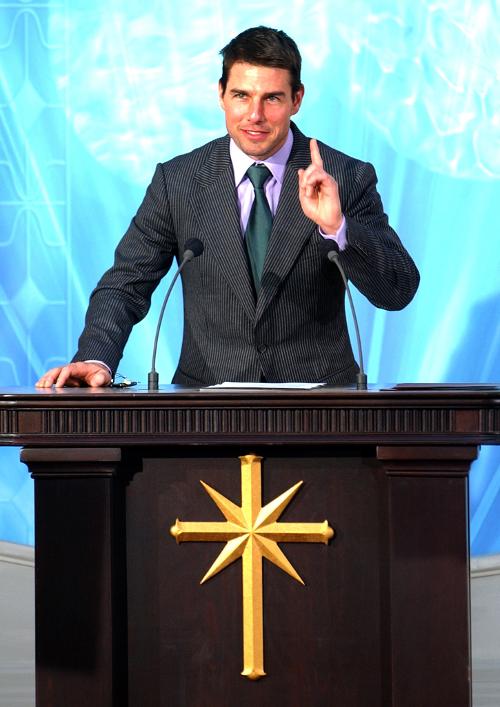
Tom Cruise at a Scientology event in 2004
This story first appeared in the Jan. 30 issue of The Hollywood Reporter magazine.
Lance Armstrong is not mad at Alex Gibney. No, not even though Gibney’s 2013 documentary, which was supposed to be about Armstrong’s triumphant emergence from retirement to compete in the Tour de France, turned out to be an exposé on doping called The Armstrong Lie.
"I remember vividly when he reached out to me to tell me he had selected the title," Armstrong says. "I said, ‘OK, it doesn’t make me feel great,’ but I don’t blame him. I did lie. What the f—- are you going to say?" He still thinks Gibney portrayed him as more untruthful than he actually was, but he admires the filmmaker’s brains as well as his willingness to tackle subject matter such as that of Gibney’s new film. "This Scientology thing — that just takes a huge set to take on," Armstrong says. "But he has the courage to do it."
Gibney’s film, based on Lawrence Wright’s 2013 best-seller Going Clear: Scientology, Hollywood and the Prison of Belief, is set to become one of the most-talked-about documentaries at the Sundance Film Festival. The exhaustively researched (and lawyered) exploration of the controversial church and its ties to Hollywood is set for a Jan. 25 premiere at the MARC Theater and will air March 16 on HBO after an awards-qualifying theatrical release in New York and Los Angeles.
Going Clear is the latest film to emerge from what has become Gibney’s amazingly prolific factory of awards-magnet documentaries. (Having written about Scientology over the years, I should state that I am a talking head in the film.) It features vintage footage of enigmatic church founder L. Ron Hubbard as he builds his empire as well as rare sequences shot inside Scientology gatherings, some of which include the church’s biggest star, Tom Cruise.
"I think what viewers will get from this is a visceral sense of what it’s like to be inside the church," says Gibney. Hint: a lot of upbeat oratory from church head David Miscavige, often followed by rapturous applause. The film brings to life much of the material covered in Wright’s book — one former church member alleges on camera that Miscavige privately heaped ridicule on aspects of Cruise’s personal life — but there is also material that was not in the book and is being kept secret until the premiere.
Featuring interviews with several fallen-away high-level church officials, the film paints a damning portrait of the involvement of Scientology’s highest-profile members, Cruise and John Travolta, which continues despite numerous allegations against the church that claim forced labor and other abuse under Miscavige’s leadership. At one point, Wright ponders what might curb Miscavige’s power. The IRS could strip Scientology of its nonprofit status, he muses, or “some of these celebrity megaphones could turn against the church. And Tom Cruise should be leading that chorus.”
Representatives for Cruise and Travolta declined to comment on the film (which they obviously haven’t seen). On Jan. 16, the Church of Scientology took out full-page ads denouncing the film in The New York Times and Los Angeles Times, featuring a large photo of Gibney. A headline, alluding to a notorious article on campus rape that did not stand up to scrutiny, asks, “Is Alex Gibney’s Upcoming HBO ‘Documentary’ a Rolling Stone/UVA Redux?” The text that follows alleges that the movie relies on discredited sources. “The ad speaks for itself,” says Scientology spokeswoman Karen Pouw in an email to THR, adding that Gibney and HBO have not provided the church with the allegations in the film, so it could respond. (Gibney says he approached church members and officials and was either rebuffed or asked to comply with what he calls “unreasonable conditions.”) While the church supports free speech, Pouw adds, “Free speech is not a free pass to broadcast or publish information.”
Source: YAHOO


No comments:
Post a Comment